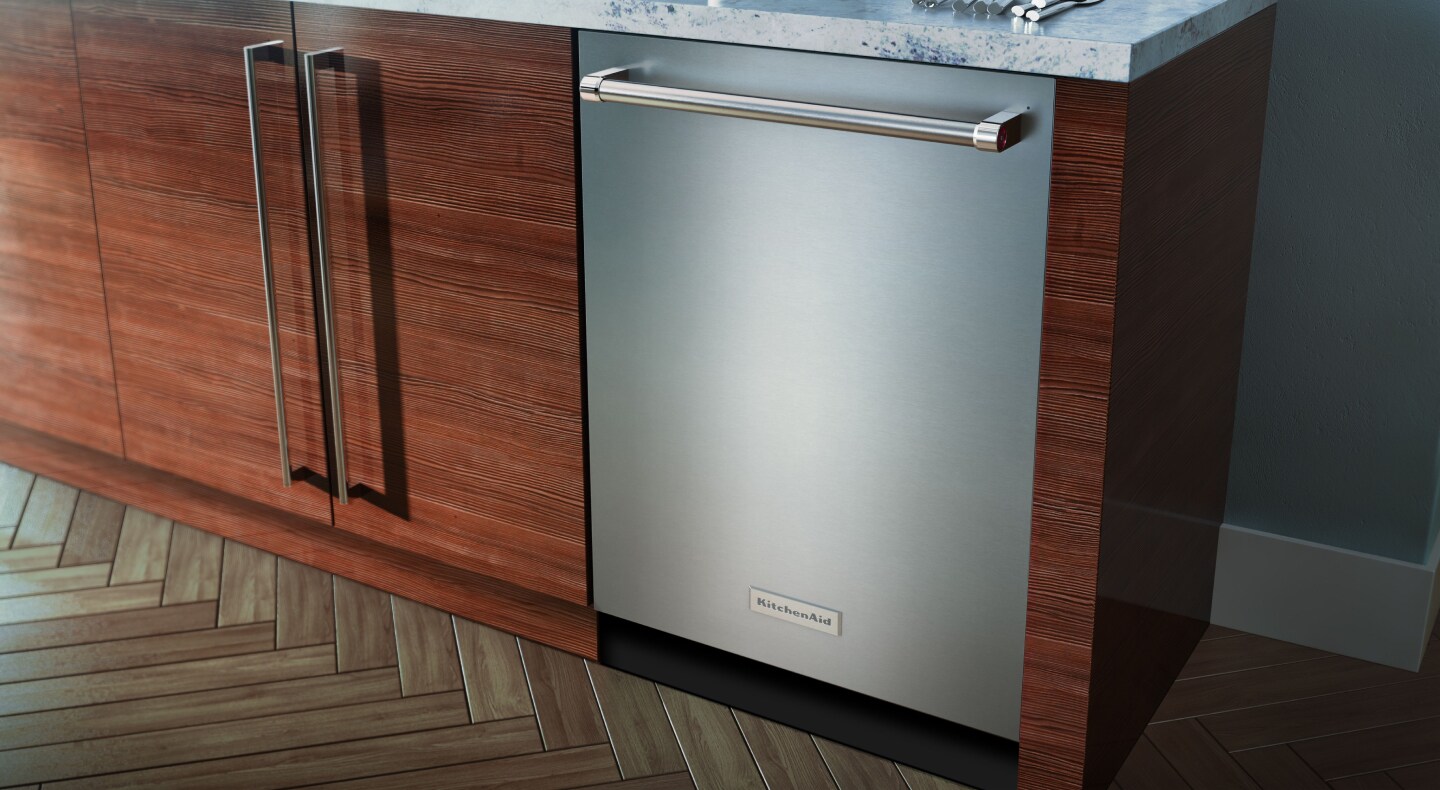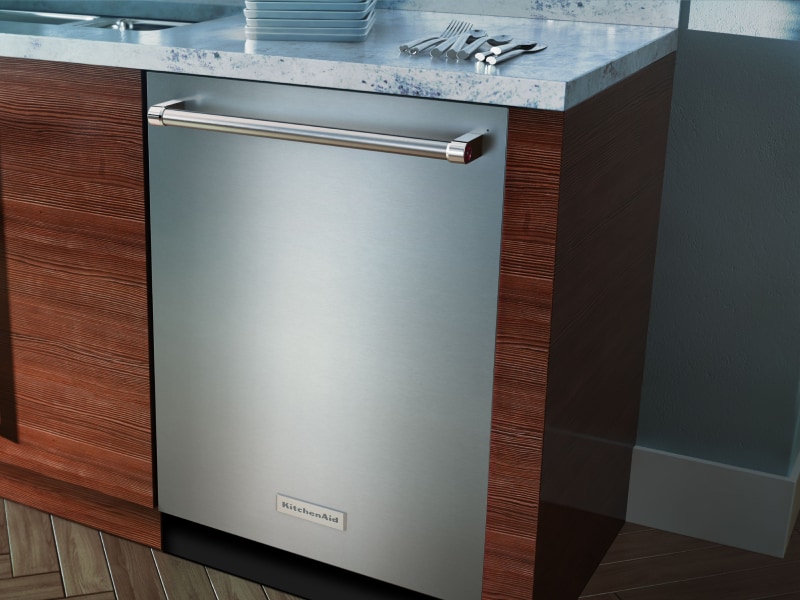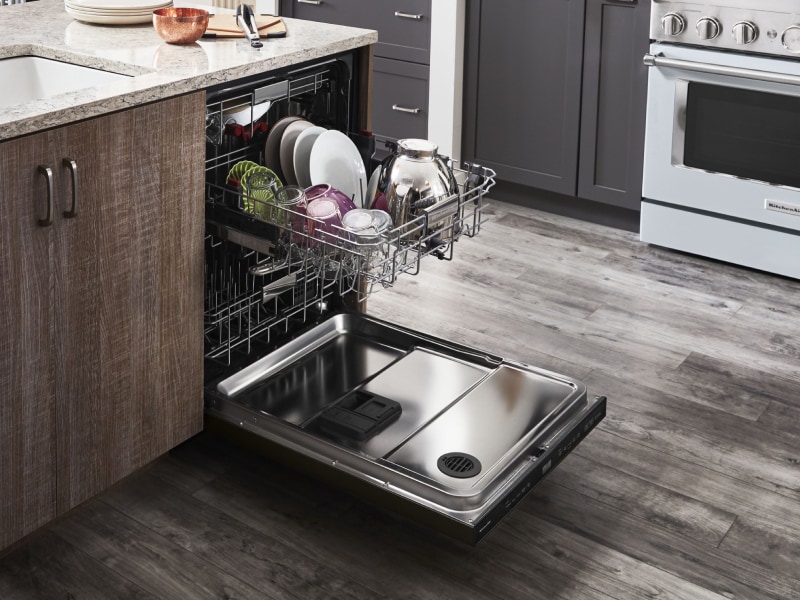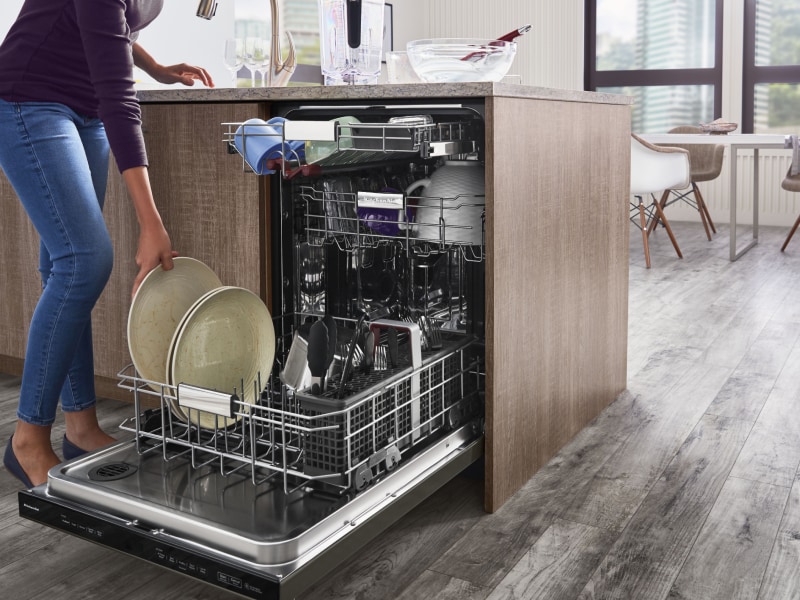
Why does my dishwasher smell?
Your dishwasher is an essential appliance that simplifies your kitchen creativity cleanup, which is why it's important to regularly maintain it. If there are any unpleasant smells coming from your dishwasher, use this guide to help figure out the issue and restore your dishwasher’s freshness.


Is it normal for a dishwasher to smell?
If your dishwasher has a new plastic smell, this is normal and should dissipate in about two weeks. Try using affresh® dishwasher cleaner to help remove the odor.1 If your dishwasher has a slight petroleum smell, this can also be normal. Some models have sound-deadening material that smells like petroleum; the smell usually dissipates in 4–6 weeks. A varnish smell can also be normal, as some motor windings are treated with a varnish. This smell should wear off in approximately one month.
If your dishwasher smells like fish or rotten food, you may have a clogged dishwasher drain or a dirty filter. A sewage or wet dog smell can point to a drainage problem which may require professional inspection. For these types of smells, continue reading to learn more about their causes and potential fixes.
1. affresh® brand products and the recommending brands’ products are all owned and distributed by Whirlpool Corporation.


6 reasons why my dishwasher smells and how to help fix them
Dishwashers are an important component to kitchen creativity, simplifying cleanup so you can spend more time making. However, they can become a source of frustration when they smell unpleasant. There are various reasons why your dishwasher may be emitting odors, including food debris, clogged filters and drainage problems. Fortunately, there may be steps that you can take to tackle these issues and eliminate odors.
1. Clogged dishwasher filter
A dirty filter is usually the primary culprit behind unpleasant smells coming from your dishwasher. The filter in your dishwasher can accumulate food debris, which, without regular cleaning, can cause unwanted odors. A clogged filter can also hinder proper cleaning of your dishes by recirculating dirty water.
Possible solution
To help restore your dishwasher’s freshness and eliminate odor, you should remove and clean or replace the filter. Check your owner’s manual for specific directions. Note that not all dishwasher filters need to be cleaned. If your dishwasher features a maintenance-free filter, this is not likely the cause of smells.
2. Grease build-up
Another issue that can cause an unpleasant odor in your dishwasher is grease build-up. Grease can accumulate in the drain and filter as well as the interior of the dishwasher.
Possible solution
Consider cleaning the interior of the dishwasher with affresh® dishwasher cleaner or another dishwasher cleaner. If the dishwasher is connected to a garbage disposal, be sure the knockout plug has been removed from the disposal inlet. Finally, clean the dishwasher filter and replace it. Consult your owner’s manual for more information.


3. Drain hose broken or leaking
The drain hose in your dishwasher plays a vital role in disposing dirty water and food particles into the sink's disposal unit. A malfunctioning drain hose can be the reason behind the unpleasant smell emanating from your dishwasher.
Possible solution
To help determine if this is the issue, simply remove the lower access panel and observe the condition of the floor. If the floor has been damaged by water or water is observed, a leak is likely present. In the event of a leak, you may need to seek the assistance of a professional.
4. Leftover food
Odors may occur from dirty dishes and food soils that fall into the tub or other parts of the dishwasher. Scraping dishes before loading, running regular cycles and cleaning leftover food out of the dishwasher can help ensure that it smells fresh and your dishes come out clean.
Possible solution
If the dishwasher is not used daily, you can run a rinse cycle with the partial load until a full load is ready to be washed. Use affresh® dishwasher cleaner regularly to keep the dishwasher tub clean of soils. You can also run a vinegar rinse through the dishwasher by putting two cups of white vinegar in an upright glass measuring cup, or any dishwasher safe container, in the lower rack. Run a normal cycle with no detergent and the dry option turned off.
5. Standing water
Standing water in the dishwasher can cause a sewage smell. This can occur if your dishwasher has drainage problems. If this is the case, you might notice that the smell also comes from your kitchen sink drain since dishwashers are often connected to the same drain.
Possible solution
To solve drainage issues, there are a few things you can try. First, run a Normal cycle to see if it drains. If the dishwasher is connected to a garbage disposal, try running the disposal to make sure it isn’t clogged. Also, be sure the knockout plug has been removed from the disposal inlet. Check your owner’s manual for instructions on how to do this. You can also try cleaning your dishwasher’s drain basket, in case it has any food or debris in it that is preventing the dishwasher from draining.
6. Mildew
The warm and moist environment created by your dishwasher can cause mildew. One area that is particularly susceptible to mildew growth is the gasket seal on the dishwasher door.
Possible solution
If your dishwasher smells, it's recommended to inspect and clean the door's seals using a damp cloth to remove any visible mold or mildew. You can also leave your dishwasher door slightly ajar when not in use or for a few hours after running a cycle. This can help improve air circulation and reduce moisture trapped inside.
How to deodorize a dishwasher
Dishwashers are a great convenience in the kitchen and keeping them fresh will help ensure your dishes come out clean. Below are some practical steps that you can take to deodorize your dishwasher and restore its freshness.
Supplies
White vinegar
Dish soap
Tools
Dishwasher-safe bowl
Sponge
Soft-bristled brush
Clean, dry towel
Step 1: Empty the dishwasher
For easier access to your dishwasher’s interior, empty all dishes, glassware and utensils prior to deodorizing.
Step 2: Remove and clean the filter
To clean your dishwasher's filter, start by pulling out and removing the bottom dish rack. Consult your owner’s manual for specific instructions on how to remove the filter, as the process can vary depending on the model. Once you've removed the filter, empty any debris and soak it in warm, soapy water to remove any grime or buildup. For stubborn particles, gently scrub the filter using a soft-bristled brush. Once the filter is clean, put it back into the dishwasher.
Step 3: Clean the dishwasher interior
Pour two cups of white vinegar into a lidless dishwasher-safe bowl and place the bowl on the bottom rack of your empty dishwasher. Select a dishwasher cycle with the dry option turned off. As the dishwasher runs, the vinegar will mix with the wash water to neutralize odors and sanitize your dishwasher.


Step 4: Clean the gasket seals
Mildew or mold can grow on your dishwasher’s gasket seals if not properly maintained, which can lead to a musty odor. To help prevent this, it's essential to regularly clean your dishwasher's gasket seals. Start by using a sponge and warm, soapy water to wipe away any buildup on the seals. Once the buildup is removed, use a clean towel to dry the seals completely, ensuring there is no residual moisture that could encourage mildew or mold growth. Leaving the dishwasher door slightly open can also help dry out the interior.
Step 5: Schedule service with a licensed technician
In the event that your dishwasher continues to have an unpleasant odor even after following the troubleshooting tips, it's possible that there may be a clog in the drain hose or a more complex problem. Your dishwasher may require the expertise of a professional to diagnose and repair.
For KitchenAid® dishwasher owners, a convenient option is to visit the KitchenAid® service center and schedule a repair service for their KitchenAid® appliance. A professional technician can thoroughly examine the dishwasher and potentially provide effective solutions to eliminate the odor and restore optimal functioning.


How do I clean a dishwasher trap?
Use the steps below to clean your dishwasher’s trap. Consult your owner’s manual for specific instructions as they may vary by brand, model and dishwasher design:
Turn the upper filter assembly ¼ turn counterclockwise and lift it out.
Grasp the lower filter in the circular opening, lift slightly and pull forward to remove.
Rinse the filter under running water until most soils are removed. If you have hard-to-remove soils or calcium deposits from hard water, a soft brush may be required.
Replace the filter by placing the lower filter under the locating tabs at the bottom of the dishwasher so the round opening for the upper filter assembly lines up with the circular opening in the bottom of the tub.
Insert the upper filter assembly into the circular opening in the lower filter.
Slowly rotate the filter clockwise until it drops into place. Continue to rotate until the filter is locked into place. If the filter is not fully seated (still turns freely), continue to turn the filter clockwise until it drops and locks into place.


How can I prevent my dishwasher from smelling?
With regular cleaning and maintenance, you can help keep your dishwasher free from unpleasant odors.
Clean your dishwasher filter regularly to prevent food particles from accumulating.
Avoid overloading your dishwasher racks to allow water and soap to pass through each dish and help break down food debris.
- Use dishwasher cleaning agents, such as affresh® dishwasher cleaner, to reduce odor-causing residues and maintain a fresh scent.


How often should I clean my dishwasher?
To help avoid bad dishwasher smells and help ensure your dishes come out clean after every wash, clean your dishwasher about once every 30 days. To learn more about maintaining a fresh dishwasher, you can check out this comprehensive guide.
Shop KitchenAid® dishwashers
Discover a variety of loading options, advanced cleaning features and sleek designs on select models to help cooks in every kitchen master the mess of making with KitchenAid® dishwashers.